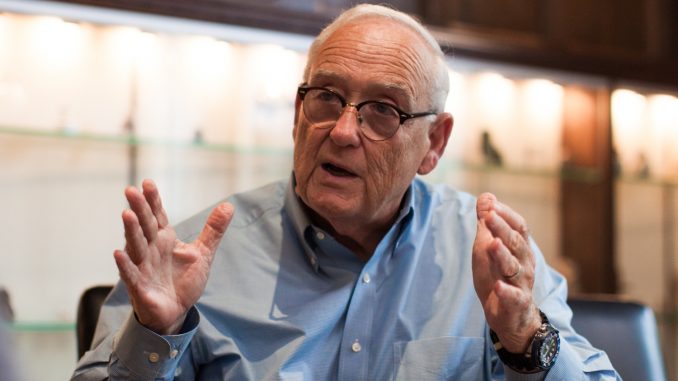
Temple University will increase community maintenance programs in the areas surrounding Main Campus in the wake of its decision to delay submitting proposals for an on-campus stadium to the Philadelphia City Planning Commission.
Bill Bergman, vice president of public affairs, told The Temple News on Aug. 21 that the university has worked to improve community outreach this summer after missing its self-imposed, end-of-June deadline to submit a proposal for an 35,000-seat, on-campus stadium.
The university does not have a new predicted deadline to submit a proposal, Bergman said.
“I think our first output has always been how to improve the neighborhood, and that’s what I think we’ve tried to do and we continue to do,” he said.
THE MOVE OUT
Bergman said university officials tested their plan to hire university maintenance employees, non-profit organizations and trash removal services to remove garbage during what he called “the move out,” or the period when large numbers of students leave their off-campus apartments each July.
“I’ve never seen trash like this in my life, bar none,” Bergman said of the debris left by students last month. “People would dump the whole contents [of their apartment] on the pavement.”
“You had old mattresses, you had old couches, old beds, old beat-up furniture, but to the point that you could not walk down the sidewalk,” he added.
Bergman said he had difficulty navigating his car down Gratz Street near Montgomery Avenue because of the trash piles.
Sophomore communication studies major Emma Gibney lives in an off-campus apartment on 11th Street near Diamond. She said that when she arrived, she was approached by neighbors who their expressed concerns about how Temple students handle trash.
“There are so many people in my area that have been living here for years, and I think it’s really unfair for students to treat their neighborhood like trash,” Gibney said.
THE PLAN
Temple’s response to the trash from “the move out” included work from the university, the city and outside firms.
University maintenance employees made rounds in trucks to help start the process of clearing neighborhood streets.
The university also enlisted the help of the Philadelphia Streets Department to increase the number of trash days for the neighborhood from July 29 through Aug. 4. The neighborhood was serviced by three trash days instead of one, Bergman said.
Temple Police issued more than 250 trash violations to area landlords from July 29 through Aug. 4. Bergman said this was a high amount of tickets for the time period.
The university hired JDog Junk Removal & Hauling, a primarily veteran-staffed cleanup company, to pick up large appliances and furniture left out as garbage last Friday. Notices were sent out to community residents to place applicable items, like old furniture and mattresses, out for the company to take.
MOVING FORWARD
After the opening of White Hall on Main Campus in 1993, the university set up a trust fund for neighborhood improvements. Community groups, like the Susquehanna Business Association, were given access to the trust, Bergman said.
This past summer, the SBA used $45,000 of $98,000 in the account to hire North Philadelphia non-profit One Day At A Time to sweep nearby streets, Bergman said.
ODAAT employees have begun working Mondays, Wednesdays and Fridays in an area bounded by Norris Street to the south, Dauphin Street to the north, Broad Street to the east and 18th Street to the west.
ODAAT did not respond to multiple requests for comment.
“We found ourselves in a situation with trash move out that was really a struggle,” Bergman said. “The city struggled, Temple struggled to handle it and that’s why we went to look for these extra resources.”
“I think people would be disappointed in the move out, but I think people would say, ‘Temple tried the best they could to get it straight,’” he added.
Community maintenance programs using ODAAT and JDog Junk Removal & Hauling will continue throughout the beginning of the school year, Bergman said.


so, if Temple builds a stadium we can expect “People would dump the whole contents [of their apartment] on the pavement.” and “You had old mattresses, you had old couches, old beds, old beat-up furniture, but to the point that you could not walk down the sidewalk,” on game days? oh me, oh my!